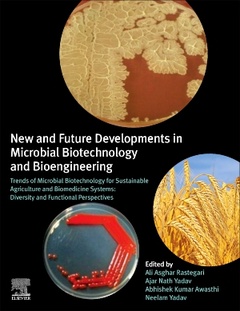New and Future Developments in Microbial Biotechnology and Bioengineering Trends of Microbial Biotechnology for Sustainable Agriculture and Biomedicine Systems: Diversity and Functional Perspectives
Coordonnateurs : Rastegari Ali Asghar, Yadav Ajar Nath, Yadav Neelam

2. The Contribution of Microbial Biotechnology to Sustainable Development in Agriculture and Allied Sectors
3. Microbial Technologies for Enhance Production Crops for Future Needs
4. Role and Potential Applications of Plant Growth Promotion Rhizobacteria for Sustainable Agriculture
5. Mechanistic understanding of root-microbiome interaction for sustainable agriculture in polluted soils
6. Plant Root-Microbe Relationship for Shaping Root Microbiome Modification in Benefit Agriculture
7. Biodiversity, Phylogenetic Profiling and Mechanisms of Colonization of Seed Microbiomes from Different Host Plants
8. Biotechnological Applications of Seed Microbiomes for Sustainable Agriculture and Environments
9. Microbial Biofilms: Beneficial Applications for Sustainable Agriculture
10. Microbial Phytases in Phosphorus Acquisition for Plant Growth Promotion and Soil Health
11. Potassium solubilizing and mobilizing microbes: Biodiversity, mechanisms of solubilization and biotechnological implication for alleviations of abiotic stress
12. Scientific Health Assessments in Agriculture Ecosystems– Towards a Common Research Framework for Plants and Humans
13. Cyanobacteria: A Perspective Paradigm for Agriculture and Environment
14. The Role of Microbial Signals in Plant Growth and Development: Current Status and Future Prospects
15. Microbial Pesticides: Current Status and Advancement for Sustainable Environments
16. Saline Microbiome: Biodiversity, Ecological Significance and Potential Role in Amelioration of Salt Stress in Plants
17. Global Scenario and Future Prospects of Potential Microbiome for Agriculture
18. Microbial Biotechnology for Sustainable Agriculture: Conclusion and Future Challenges
- Introduces the principles of microbial biotechnology and its application in plant growth and soil health for sustainable agriculture
- Explores various plant microbiomes and their beneficial impact on plant growth for crop improvement
- Explains the mechanisms of plant-microbe interaction and plant growth promotion
- Includes current applications of microbial consortium for enhance production of crop in eco-friendly manners
Date de parution : 05-2020
Ouvrage de 366 p.
21.4x27.6 cm
Thème de New and Future Developments in Microbial Biotechnology... :
Mots-clés :
Abiotic stress; Agricultural applications; Agriculture; Alleviations; Amelioration; Bacteria; Biocontrol; Biodiversity; Biofertilizer; Biofertilizers; Biofilm; Biofuel; Bioinoculants; Biopesticides; Bioremediation; Biotechnological applications; Colonization; Cyanobacteria; Distribution; Endophytes; Food security; Functional Annotation; Fungi; Gene expression; Global warming; Growth dynamics; Heavy metal contamination; Microbes; Microbial; Microbial diversity; Microbial pesticides; Microbial phytases; Microbial technology; Microbiome; Nematodes; Pest management; PGP attributes; PGPR; Physiology; Phytoremediation; Phytotoxicity; Plant growth promotion; Plant growth-promoting rhizobacteria; Plant microbiomes; Plant root; Plant-microbe interaction; Plant-microbes interaction; Polluted soils; Potassium solubilization; Production; Purification; Root microbiome; Salt stress; Seed microbiomes; Soil health; Sustainable agriculture; Sustainable Agriculture; Sustainable developments; Transgenics; Virus



